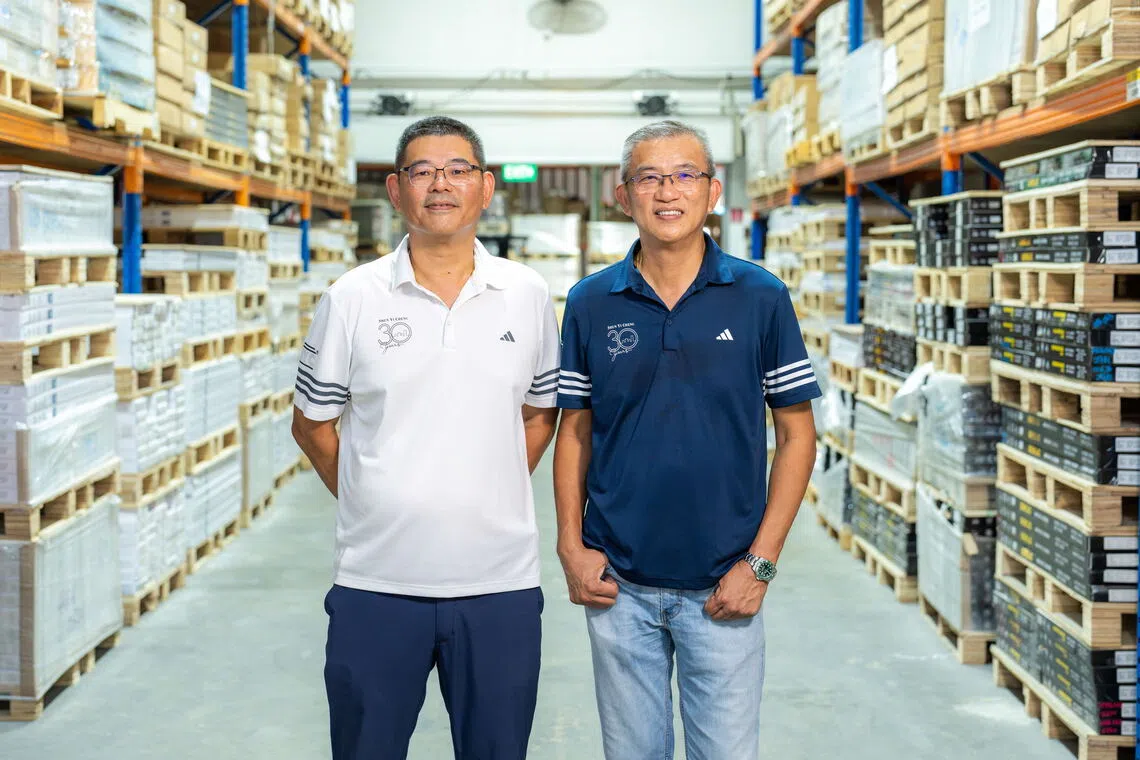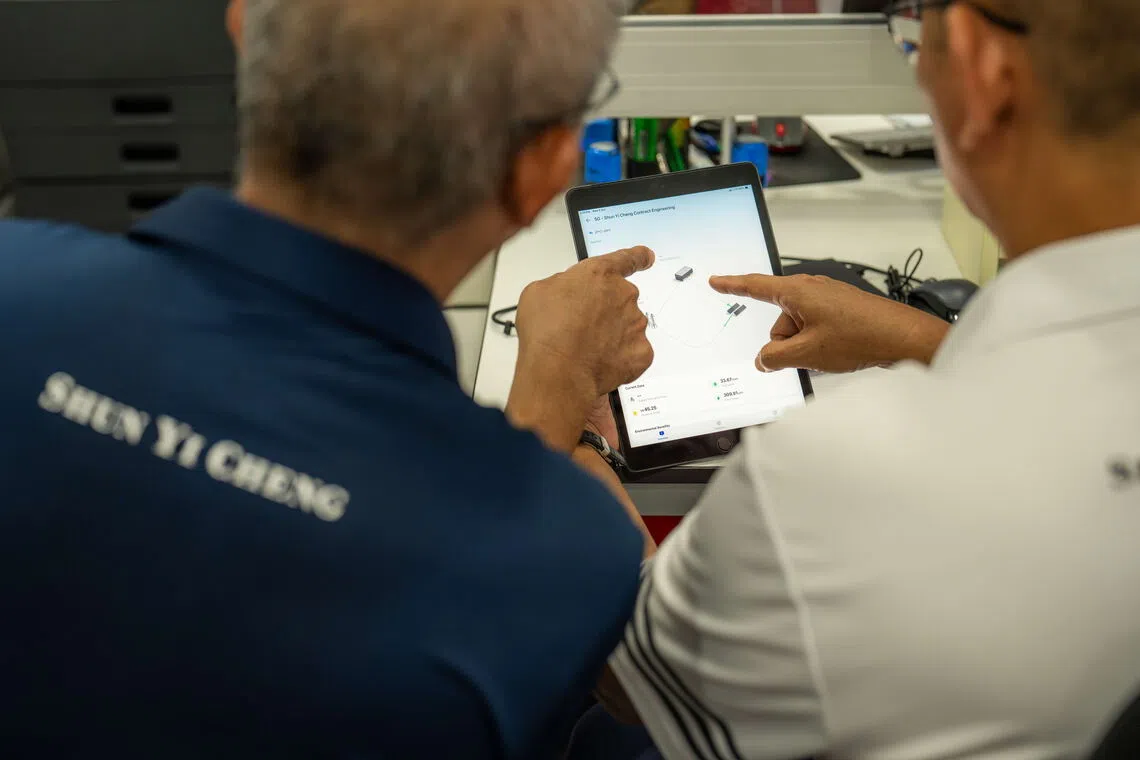Access to eco experts, tailored action plan: How local builder is empowered by ESG programme to go green
By leveraging DBS’ ecosystem of industry partners, construction firm Shun Yi Cheng has started rolling out more efficient practices, putting it on track to accelerate decarbonisation and deliver cost savings
As Shun Yi Cheng (SYC) Contract Engineering grew, a nagging question in the minds of its founders was how the Singapore company could cut its carbon footprint.
The founders of the company – a specialist in cleanroom and controlled environment solutions, set up in 1995 – were keen to decarbonise its operations to build a competitive advantage and differentiate itself from its industry peers. While the company started the journey with small steps, such as exploring the use of solar panels, its founders were unsure how to embark on a more strategic, company-wide approach.
In stepped DBS, SYC’s partner bank of 30 years. With its relationship manager’s guidance, the company founders became aware of the DBS ESG Ready Programme – which provides a structured end-to-end programme for small and medium-sized enterprises (SMEs) and mid-sized companies to become future-ready by building capabilities and capacity in sustainability.
Through client engagements, the bank had found that businesses wanted more targeted support on their sustainability journeys. Indeed, this year’s DBS Business Pulse Check Survey revealed that about 60 per cent of businesses have yet to prepare for sustainability-related regulatory requirements, with many citing high costs, complex requirements and limited resources as major hurdles.
Given the bank’s ethos to help transform businesses and communities, and combined with clients’ feedback, DBS introduced its ESG Ready Programme, with SYC being one of its earliest adopters.
“One of the biggest challenges was getting everyone – from management to ground staff – to see the importance of sustainability. DBS’ ESG Ready Programme gave us a clear pathway, an understanding of the gaps we needed to address and the opportunity to align the team with our sustainability goals,” explains SYC co-founder Bryant Ng.
The programme, supported by Enterprise Singapore (EnterpriseSG), is all-encompassing: companies can receive tailored support from DBS managers; attend relevant courses curated by the bank; consult with sustainability specialists; establish their carbon footprints; receive tailored decarbonisation action plans; tap support from EnterpriseSG to defray some of the costs for eligible activities; and access DBS’ financing solutions at preferential rates.
“Sustainability is becoming a strategic advantage for businesses, helping them cut costs, build resilience and stay competitive. With SYC, we have seen how practical steps like solar adoption can deliver real cost savings, while training courses have upskilled its team to become ESG advocates,” says Soh Wee Li, head of corporate banking, at DBS Singapore.
Ecosystem of experts ensures support on all fronts
The bank believes that meaningful transformation for SMEs requires a robust ecosystem to help turn ambition into action. Hence, DBS sought to understand SYC’s motivations and challenges by having early conversations with the company that included not only DBS programme managers but also the bank’s suite of sustainability partners.

With a better understanding of SYC’s needs, DBS recommended suitable upskilling courses for the company to kickstart its journey. One of the courses was a private session with Republic Polytechnic. The session was tailored to the company’s business needs by taking into account its sectoral requirements and by sharing relevant case studies and concepts.
DBS was able to facilitate this given its collaboration with SkillsFuture Singapore, a partnership forged to meet SMEs’ increasing demand for green skills. DBS is now in its fourth year as a SkillsFuture Queen Bee, making it the longest-serving financial institution supporting smaller firms’ business transformation.
“There are so many sustainability-related courses out there, and DBS helped us identify the ones most relevant to our sector and stage of sustainability maturity. The training gave our team practical guidance we could apply immediately and it empowered us to take ownership of green practices and become ESG advocates,” says Stella Chan, assistant operations manager at SYC.
Concurrently, SYC tapped the expertise of DBS’ partner-specialists ESGpedia and Deloitte.
ESGpedia aided the company in utilising its digital platform to establish its carbon baseline and greenhouse gas reporting – a milestone considering it lacked an emissions tracking system before.
Deloitte then stepped in with a tailored roadmap that outlined sustainability targets, actionable insights and opportunities to guide SYC.
Recommendations included switching to cleaner and more efficient electric-powered construction equipment; pursuing Building and Construction Authority’s Green and Gracious Builder Scheme Certification to enhance its reputation and edge in securing future contracts; exploring other aspects to cut emissions, including waste management and employee commute; and strengthening its governance structure with clearer roles and responsibilities for staff.
Deloitte’s roadmap built on SYC’s earlier plans to digitise its documents and install solar panels. This endorsement helped the company crystallise its plans, with significant results: The company has streamlined paper usage considerably, while the switch to cleaner energy at one of its worker dormitories has started yielding cost savings of around $6,000 annually. The company is now looking to install solar panels at its other dormitories.
These developments were possible as DBS partnered its network of eco experts to customise a comprehensive action plan for SYC, after stepping into its shoes to fully understand its needs.
Small, achievable steps to go green
But SYC is not stopping here.
Building on its progress, it is now looking to influence the wider industry by promoting the use of modular steel or aluminium-surfaced sandwich panels to replace the drywall partition system. Ng explains that sandwich panels have similar fire-resistant properties compared to drywalls or plasterboards, but the upside is they are more durable and sustainable, and easier to install.
At the company level, SYC has switched from using wooden pallets as shipping material to steel pallets as the latter are more durable and can be easily stored for future use, says Ng.
During its twice-yearly training sessions, SYC also strives to inculcate in its staff the value of prudent water and electricity consumption.

As Chan explains, “Sustainability can start with small and achievable steps. Once you start, you will gain momentum and motivate the people around you to adopt the practice for the long term.”
For SYC, the journey is far from over. With clearer goals, DBS as a long-standing partner, and the right ecosystem of support, the company is confident of building a greener future one step at a time, alongside many other businesses navigating this transition.
“At DBS, we are here to make that possible – through our role as a SkillsFuture Queen Bee and with initiatives like the ESG Ready Programme that give companies the skills, connections and roadmaps to move forward with confidence,” says Soh.
Find out more about the DBS ESG Ready Programme from its website.
DBS ESG Ready Programme at a glance
- Launched in partnership with EnterpriseSG in April 2024
- Platform to help local companies decarbonise their operations, access DBS sustainable financing
- First bank programme in the market to defray up to 70 per cent of the costs for eligible activities, including upskilling, carbon assessment, strategy and roadmap development, decarbonisation activities as well as certification and assurance services

Decoding Asia newsletter: your guide to navigating Asia in a new global order. Sign up here to get Decoding Asia newsletter. Delivered to your inbox. Free.
Share with us your feedback on BT's products and services
